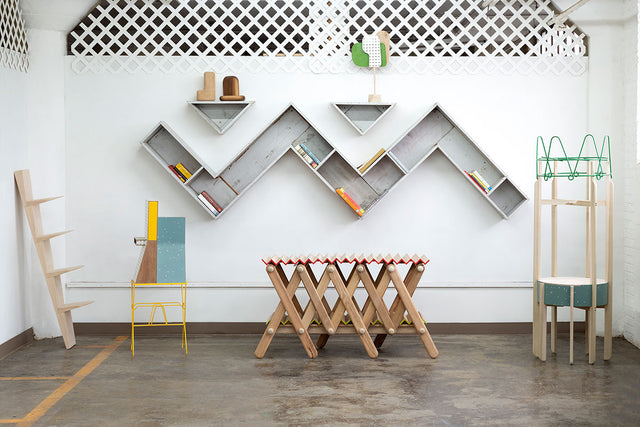Norman Teague: The Bureaus of Reconstruction
For the contemporary American designer, Norman Teague, everyday black life and domestic space has, historically, remained invisible to the intentional disinterest of the White gaze. The result are narratives of design history with gaps, omissions, cracks, and skips that limp out of step with a shared reality we communally sense are richer, deeper, more plural: in need of Reconstruction.
"Design covers everything that humans come in contact with…Just imagine if there were more people of color in design."

Collage by Bob Faust
Converso is pleased to present, The Bureaus of Reconstruction, for your wonder, delight, and edification: works by the Chicago based designer, Norman Teague.
Norman Teague’s rising profile in recent Design is the result of body of work that has elegantly balanced a social practice that has used Design for platforms of engagement with his South Side Chicago community; and a studio practice increasingly focused on the production of experimental and highly resolved furniture and objects expressing design with a “Black intent”.
Teague’s voice is large and multidisciplinary with over a dozen recent museum acquisitions (and counting): a recent NYC show with R & Co, the launch of his 2021 Africana seating series at Design Miami, his appointment as a Creative Collaborator for the Barack Obama Presidential Center, a tenured UIC professorship, and an upcoming collaboration with Knoll. He has a long history of collaboration with the artist Theaster Gates, serving as lead on Gates’12 Ballads for Huguenot House at dOCUMENTA 13 in Kassel. He is co-founder, along with Fo Wilson, of blkHaUS Studio, which has completed projects in Chicago and Lagos, Nigeria for clients as diverse as Solange Knowles and the MCA.Teague was a recent Prada Experimental Design Lab award winner.
Anticipating his collaboration with Knoll, Teague’s work will sit in dialogue with historic Knoll pieces from the Converso Archive, posing questions about where a Black 21st C designer is positioned in relation to the modernist design canon. The classic 1954 Florence Knoll Sofa will be reimagined with materials borrowed from Streetwear.

Teague’s Zig Zag Bookshelf, made from materials from the foreclosed and condemned houses of Bronzeville and sourced from the formidable South Side picker, Miss Lady, support Teague’s library of design and Black political theory. Salvaged materials have traveled an elegant circle to redemptively support texts as tools for the unraveling of structures that undermine Black access to housing wealth. The Zig Zag will face a signature Florence Knoll Wall-Mounted Cabinet created in 1958 by the Knoll Planning Unit for the executive suites of SOM’s Riley Research Center for the H.J. Heinz Co in Pittsburgh.

Hutch is a folding wooden console with a serrated, wooden top edged in color and hinges around large, toy like, purpose made screws, also wooden. Like Zig Zag, it takes part of its inspiration from the Asante Adinkra textile symbol meaning “to do the impossible”. Teague’s process often involves research into “foundational objects," such as handcrafts from Ghana and Nigeria existing outside the Western canon, connecting him to some of the oldest cultural traditions on the planet. The results, like his much lauded Sinmi stool (Sinmi is Yoruba for “relax”.) can be completely unexpected, new typologies.
Also on view will be a new suite of tables, objects, and wall pieces that began life as a scavenged collection of disparate table bases and materials Teague collected from the massively derelict Spiegel building on Chicago’s South Side that now houses his studio. Sitting between functional Design, small architectures, and Dadaist sculpture, the works suggest new functional uses and recover collage in its early modernist sense as a collision of cast off signifiers during a time when african aesthetics contributed to the development of modernism. They also encapsulate the view from Teague’s studio window: a diverse multiracial, multiethnic Bauhaus inflected urban cityscape: Chicago, seen from the South Side.

